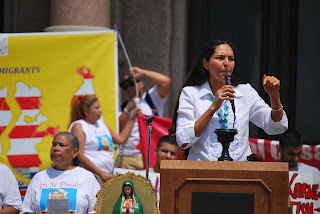Julian Aguilar from The Texas Tribune reported on HB 12 in an article published on March 30, 2011.
HB 12 by Carrolton Republican Burt Solomons has advanced the furthest of all the immigration bills making it out of the State Affairs Committee. This bill would prohibit cities, counties, and other governmental entities from adopting a policy that prevents law enforcement from asking about a person’s immigration statues.
Governor Perry has stated he wants law enforcement to have the option to inquire about immigration status. He claims this is different from mandating inquiring immigration status, since it only gives law enforcement the power to “use discretion.”
The article suggests this bill would cost local governments, because more personnel and more jail space would be needed.
The original bill included school district employees, which led Democrats to protest how the policy would affect education. Under both state and federal constitutions schools must educate students regardless of their status. The modified bill excludes school district, charter school, and junior college employees, except for campus police.
The article can be found here: http://www.texastribune.org/texas-legislature/82nd-legislative-session/texas-lawmakers-prepare-for-sanctuary-city-battle/.




